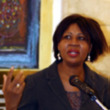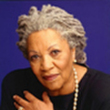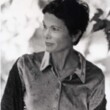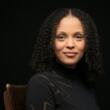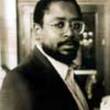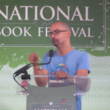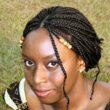”She told me about a group of people in Guinea who carry the sky on their heads. They are the people of Creation. Strong, tall, and mighty people who can bear anything. Their Maker, she said, gives them the sky to carry because they are strong. These people do not know who they are, but if you see a lot of trouble in your life, it is because you were chosen to carry part of the sky on your head.” (p. 25) Breath, Eyes, Memory is Danticat’s first novel, and while it suffers from some familiar flaws of first novels, it rises above those to tell a painful and beautiful story of family and women in Haiti. There are many layers to the story – the immigrant experience in New York, political violence in Haiti, maternal love, duty to family – and all are told in a rich prose that I imagine, were it tangible, would have the consistency of a thick, sweet caramel. ”Great gods in Guinea, you are beautiful,” [he] said… “I would crawl inside your dress and live there. I can feed on your beauty like a leech feeds on blood. I would live and die for you. More than the sky loves its stars. More than the night loves its moon. More than the sea loves its mermaids. Strike me, thunder, it’s no lie. We do not know one another, I know. Still I must tell you. You can be the core of my existence. The ‘I’ of my ‘We.’ The first and last letter of my name, which is ‘Yours,’…” (p. 93) Sophie is twelve when she leaves the only home she has ever known – with her aunt in a village in Haiti – to go to her mother in New York City. But always there is Haiti, both a country and a legacy, which informs their lives and their relationship and whose traditions and superstitions cause a rift between mother and daughter. Eventually, Sophie returns to Haiti with her baby daughter, and this part of the novel with Sophie, her aunt, and her grandmother, was probably my favorite. We are treated to Haitian folk tales, religion, cooking, and other aspects of everyday life. It was both fascinating and heartbreaking. The end of the novel was less successful for me, as it seemed Danticat felt the need to throw in as many “women’s issues” as possible – abortion, bulimia, suicide, female genital mutilation – in order to indicate the Importance of her story. Unfortunately, her story needed very little else than what it already had; what could have been a 4.75 or 5 star read for me suffered from this debut author’s over-enthusiasm. Other passages I liked: “I felt broken at the end of the meeting, but a little closer to being free. I didn’t feel guilty about burning my mother’s name anymore. I knew my hurt and hers were links in a long chain and if she hurt me, it was because she was hurt, too. It was up to me to avoid my turn in the fire. It was up to me to make sure that my daughter never slept with ghosts, never lived with nightmares, and never had her name burnt in flames.” (p. 203) ”I come from a place where breath, eyes, and memory are one, a place from which you carry your past like the hair on your head. Where women return to their children as butterflies or as tears in the eyes of the statues that their daughters pray to. My mother was as brave as stars at dawn. She too was from this place. My mother was like that woman who could never bleed and then could never stop bleeding, the one who gave in to her pain, to live as a butterfly. Yes, my mother was like me.” (p. 234)
(read less)”She told me about a group of people in Guinea who carry the sky on their heads. They are the people of Creation. Strong, tall, and mighty people who can bear anything. Their Maker, she said, gives them the sky to carry because they are strong. These people do not know who they are, but if you see a lot of trouble in your life, it is because you were chosen to carry part of the sky on
(read more)





![What looks like crazy on an ordinary day [electronic resource]by Cleage, Pearl, author.](https://syndetics.com/index.php?isbn=0061807176/174h.jpg&imagelinking=1&client=auckvega&type=unbound&nicaption=What+looks+like+crazy+on+an+ordinary+day+%5Belectronic+resource%5D%1FCleage%2C+Pearl%2C+author%2E%1F)






![The autobiography of my mother [electronic resource]by Kincaid, Jamaica, author.](https://syndetics.com/index.php?isbn=1504743245/174h.jpg&imagelinking=1&client=auckvega&type=unbound&nicaption=The+autobiography+of+my+mother+%5Belectronic+resource%5D%1FKincaid%2C+Jamaica%2C+author%2E%1F)



![Their eyes were watching God [electronic resource] : a novelby Hurston, Zora Neale, author.](https://syndetics.com/index.php?isbn=0060842768/174h.jpg&imagelinking=1&client=auckvega&type=unbound&nicaption=Their+eyes+were+watching+God+%5Belectronic+resource%5D+%3A+a+novel%1FHurston%2C+Zora+Neale%2C+author%2E%1F)


![Mama Day [electronic resource] : a Novel.by Naylor, Gloria.](https://syndetics.com/index.php?isbn=1504043154/174h.jpg&imagelinking=1&client=auckvega&type=unbound&nicaption=Mama+Day+%5Belectronic+resource%5D+%3A+a+Novel%2E%1FNaylor%2C+Gloria%2E%1F)



![Songs in ordinary time [electronic resource] : a novelby Morris Mcgarry, Mary.](https://syndetics.com/index.php?isbn=1504048091/174h.jpg&imagelinking=1&client=auckvega&type=unbound&nicaption=Songs+in+ordinary+time+%5Belectronic+resource%5D+%3A+a+novel%1FMorris+Mcgarry%2C+Mary%2E%1F)
